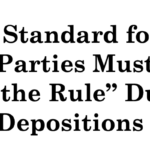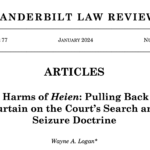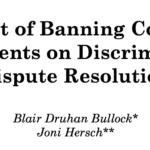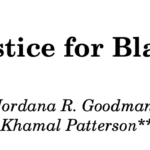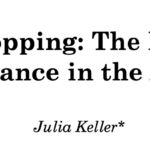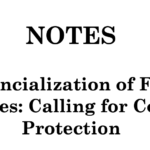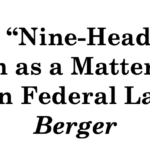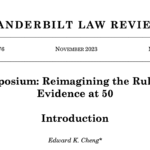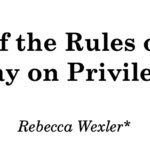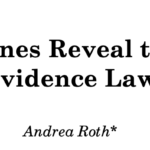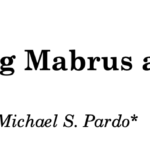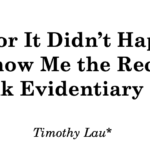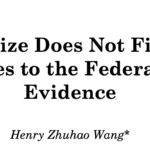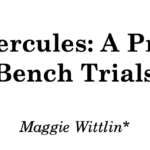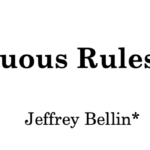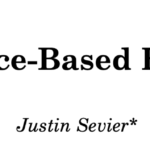Author
A Different Standard for Different Stages: Why Parties Must Be Allowed to “Invoke the Rule” During Oral Depositions
Jan. 30, 2024—Morgan Scott | 77 Vand. L. Rev. En Banc 1 Two attorneys from the same law firm are representing plaintiffs in two whistleblower qui tam lawsuits against different pharmaceutical companies. One suit has been going on for years and is finally at the trial stage; the other will likely settle after depositions are complete. Attorney...
The Harms of Heien: Pulling Back the Curtain on the Court’s Search and Seizure Doctrine
Jan. 26, 2024—Wayne A. Logan | 77 Vand. L. Rev. 1 In Heien v. North Carolina, the Supreme Court held that individuals can be seized on the basis of reasonable police mistakes of law. In an opinion authored by Chief Justice Roberts, the eight-Justice majority held that the Fourth Amendment’s prohibition of “unreasonable” seizures does not bar...
The Impact of Banning Confidential Settlements on Discrimination Dispute Resolution
Jan. 26, 2024—Blair Druhan Bullock & Joni Hersch | 77 Vand. L. Rev. 51 The #MeToo movement exposed how workplace harassment plagues employment in the United States. Several states responded by passing legislation aimed at curbing harassment and employment discrimination in the workplace. One of the most common legislative efforts was to ban confidentiality provisions in certain...
Access to Justice for Black Inventors
Jan. 26, 2024—Jordana R. Goodman & Khamal Patterson | 77 Vand. L. Rev. 109 To receive a patent, an inventor must meet certain inventive and procedural standards. Their invention must be novel, nonobvious, and written in such a way that any person skilled in the inventive subject can make and use the invention without undue experimentation. This...
Eavesdropping: The Forgotten Public Nuisance in the Age of Alexa
Jan. 26, 2024—Julia Keller | 77 Vand. L. Rev. 169 Always-listening devices have sparked new concerns about privacy while evading regulation, but a potential solution has existed for hundreds of years: public nuisance. Public nuisance has been stretched to serve as a basis of liability for some of the most prominent cases of modern mass-tort litigation, such...
The Financialization of Frequent Flyer Miles: Calling for Consumer Protection
Jan. 26, 2024—Ari Goldfine | 77 Vand. L. Rev. 233 Airlines’ frequent flyer programs operate more like a monetary system, with points as a form of currency, than a typical discount or rewards plan. In fact, airlines’ power over points is even more extensive than that of a central bank over currency—beyond simply determining how many points...
Avoiding a “Nine-Headed Hydra”: Intervention as a Matter of Right by Legislators in Federal Lawsuits After Berger
Jan. 26, 2024—Taylor Lawing | 77 Vand. L. Rev. 275 Heightened political polarization across the United States has resulted in the increased use of Rule 24(a) intervention as a matter of right by elected legislators in federal litigation concerning state law. Because states differ in their approaches to intervention, with only some states expressly granting intervention in...
Introduction
Nov. 27, 2023—Edward K. Cheng | 76 Vand L. Rev. 1603 Prior to the eighteenth century, cartographers would often fill uncharted areas of maps with sea monsters, other artwork, or even rank speculation—a phenomenon labeled “horror vacui,” or fear of empty spaces. For example, in Paolo Forlani’s world map of 1565, a yet- to-be-discovered southern continent was...
Ignorance of the Rules of Omission: An Essay on Privilege Law
Nov. 27, 2023—Rebecca Wexler | 76 Vand. L. Rev. 1609 Alton Logan spent twenty-six years in prison for a murder he did not commit, sleeping with a homemade metal shank under his pillow for protection. Meanwhile, attorney Dale Coventry kept the evidence that would ultimately exonerate Logan—another man’s confession—in a box beneath his bed. Coventry kept the...
How Machines Reveal the Gaps in Evidence Law
Nov. 27, 2023—Andrea Roth | 76 Vand. L. Rev. 1631 This Symposium asks participants to reimagine the Federal Rules of Evidence on the fiftieth anniversary of their effective date. As part of that conversation, this short Essay argues that the Rules of Evidence contain critical gaps in terms of empowering litigants to meaningfully challenge the credibility of...
On Proving Mabrus and Zorgs
Nov. 27, 2023—Michael S. Pardo | 76 Vand. L. Rev. 1653 An unfortunate disconnect exists in modern evidence scholarship. On one hand, a rich literature has explored the process of legal proof in general and legal standards of proof in particular. Call this the “macro level” of legal proof. On the other hand, a rich literature has...
“Pics or It Didn’t Happen” and “Show Me the Receipts”: A Folk Evidentiary Rule
Nov. 27, 2023—Timothy Lau | 76 Vand. L. Rev. 1681 “Pics or It Didn’t Happen,” “Show Me the Receipts,” and related refrains are frequently encountered in online discussion threads today. They are typically invoked to demand corroboration in support of a claim or to declare from the outset that a claim is supported by some sort of...
One Size Does Not Fit All: Alternatives to the Federal Rules of Evidence
Nov. 27, 2023—Henry Zhuhao Wang | 76 Vand. L. Rev. 1709 The Federal Rules of Evidence have been so successful that many people equate them to the whole field of evidence law. But this is a false equivalence. Our world is complicated, diversified, and dynamic. So, too, is evidence law, which is like a rainforest in which...
Binding Hercules: A Proposal for Bench Trials
Nov. 27, 2023—Maggie Wittlin | 76 Vand. L. Rev. 1735 If you were a federal judge presiding over a bench trial, you probably would not want the Federal Rules of Evidence to apply to you. Sure, you might want to be insulated from privileged information. But you are, no doubt, capable of cool-headed, rational reasoning, and you...
The Superfluous Rules of Evidence
Nov. 27, 2023—Jeffrey Bellin | 76 Vand. L. Rev. 1769 There are few American legal codifications as successful as the Federal Rules of Evidence. But this success masks the project’s uncertain beginnings. The drafters of the Federal Rules worried that lawmakers would not adopt the new rules and that judges would not follow them. As a result,...
Evidence-Based Hearsay
Nov. 27, 2023—Justin Sevier | 76 Vand. L. Rev. 1799 The hearsay rule initially appears straightforward and sensible. It forbids witnesses from repeating secondhand, untested gossip in court, and who among us prefers to resolve legal disputes through untested gossip? Nonetheless, the rule’s unpopularity in the legal profession is well-known and far-reaching. It is almost cliché to...
